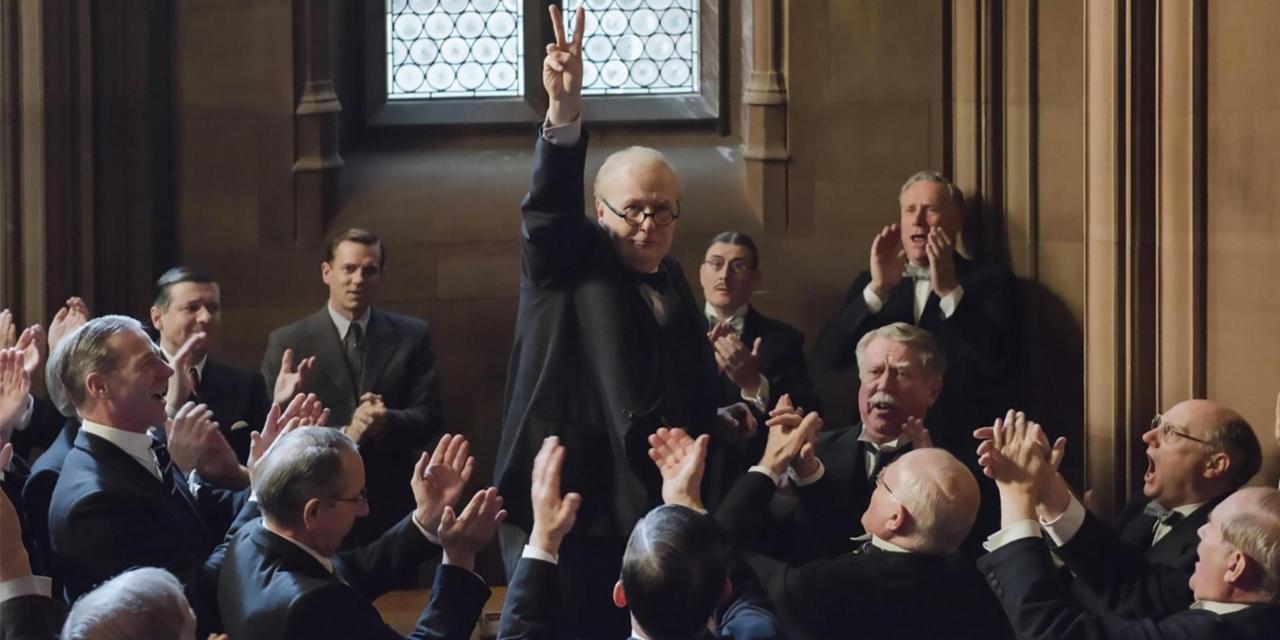Even if Churchill’s war cabinet were more behind his way of thinking, he would still be the only one to make the final decision. It’s only him who can send a detachment to try and delay the Nazis, and it’s him who knows he’s signing the death warrants of every one of those soldiers. By further isolating him away from any allies, Wright does his typically striking work of showing and not telling. Churchill repeatedly makes the long trip into the bunker that is the war cabinet meeting room by himself, riding a slow elevator through the blackness and walking down stony corridors. The viewer can feel the weight of free Europe on his shoulders in these shots.
Oldman’s awards are sealed in the full-throated, ahistorical speeches (listen to the actual fight on the beaches speech, and prepare to be lulled to sleep), but his scenes of dejection are far more powerful. A failed entreaty to FDR for more aid is staggering in its reduction of great men of history into either a desperate beggar or an ineffectual ally hampered by election year politics. Oldman plays the scene like he’s hearing from a son who won’t make it home for the holidays. Churchill is one of the towering figures of the 20th century, and Darkest Hour effectively humanizes him as a person just as bewildered by events as anyone else.
Oldman grandly dominates the film, but he gets overshadowed by another figure of the era. George VI, memorialized in The King’s Speech and played here by Ben Mendelsohn, is able to make just as much of an empathetic impression without Churchill’s theatrics. They share two scenes that ably communicates the start of a lasting partnership. The first, in which the king and the PM enact the ritual of asking the sovereign to form a government, is awkward for both, despite their aristocratic heritages. Neither man, the failed architect of Gallipoli and the stuttering second son, is supposed to be here at this moment, but they still go through the motions as centuries of counterparts have done before them. After the forced formality comes a later scene with Churchill at surrender’s doorstep, dejected and with depression’s black dog upon him. Wright uses unflattering lightning and the clutter of the surroundings to thoroughly depuff a puffed-up man. King George visits him, and they’re able to converse as two men, neither sure of what’s going to happen but able to believe that the other is capable of making the best of a series of bad choices. Both actors are great in these scenes, but it’s Mendelsohn who’s more naturalistic and therefore more affecting.
As good as much of the performances and the directing is in Darkest Hour, the script by Anthony McCarten contains plenty of flubs and missed opportunities. The dramatic change in tone from historical events can be forgiven as a blatant awards play and a pitch to American audiences. Ahistoricity is not a deal-breaker for this lover of The Social Network. What is more bothersome are the corny aspects of Darkest Hour. A subway scene late in the film, in which Churchill pumps the populace for input on what he should do, comes from a completely different film, and not a better one. It suggests a connection between the government and the average person that does not feel authentic in mid-century Britain, especially when Churchill just had the king meet him in his attic. Dillane’s contrarian Halifax is also too simplistic. The script treats him as wrong at the time in addition to being wrong through historical hindsight, and the better film sells the agonizing stakes for a nation only two decades removed from the carnage of WWI. Halifax needed to be wrong, but for the right reasons, and Darkest Hour treats him only as snide and out-of-touch.
As considerable as the bads are in Darkest Hour, the goods outweigh them enough to make Wright’s film an effective outing. There’s no easier rooting interest to be generated than against Nazi’s, something that again proves true here. Oldman’s calculated efforts paid off with an Oscar, and if this isn’t even close to his most daring work, at least the venerable, chameleonic actor is getting his accolades. If playing a big historical icon in a successful crowd-pleaser allows him to disappear under make-up and fake eyes in something truly weird, then so be it. B-

 RSS Feed
RSS Feed